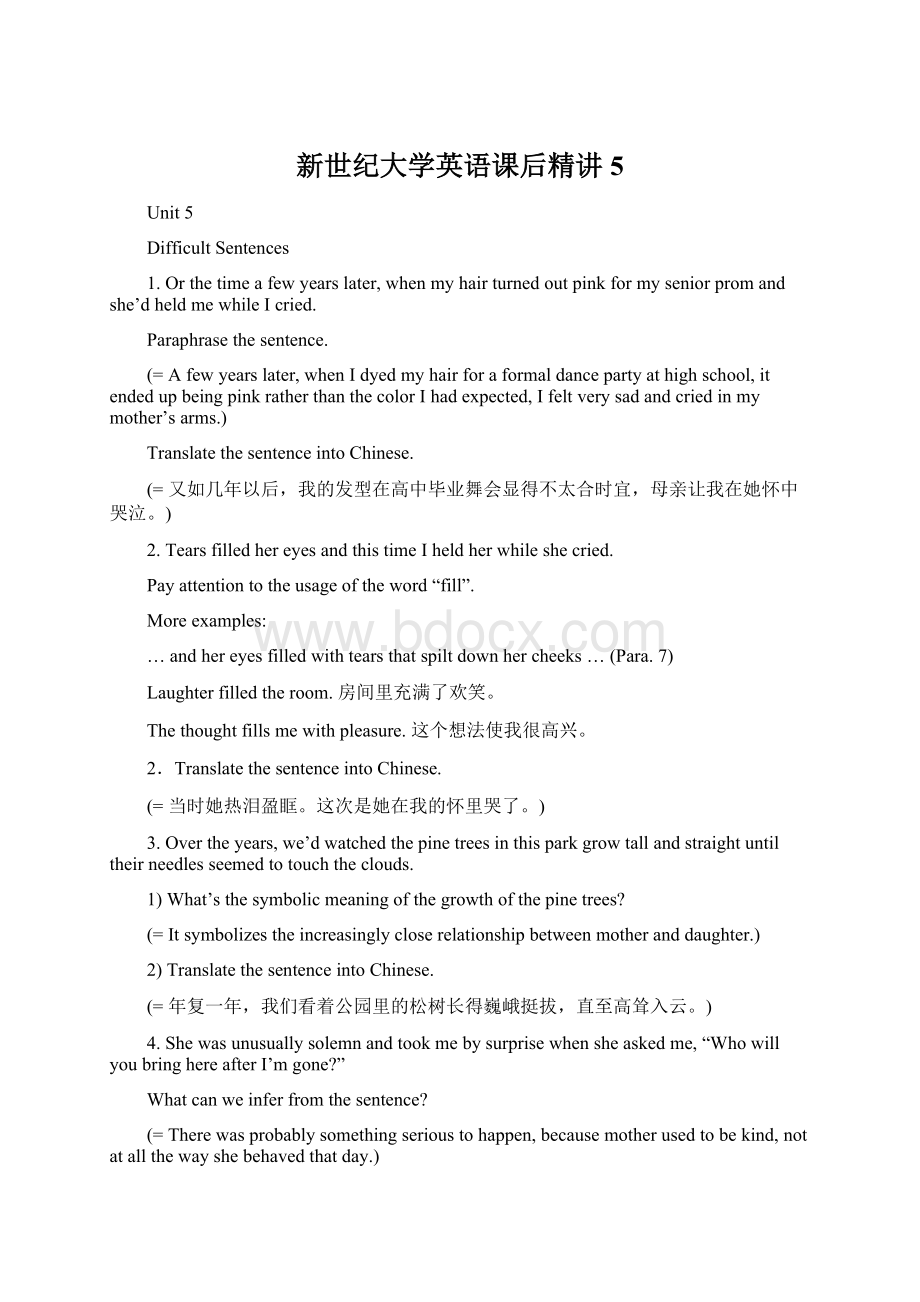新世纪大学英语课后精讲 5.docx
《新世纪大学英语课后精讲 5.docx》由会员分享,可在线阅读,更多相关《新世纪大学英语课后精讲 5.docx(13页珍藏版)》请在冰豆网上搜索。

新世纪大学英语课后精讲5
Unit5
DifficultSentences
1.Orthetimeafewyearslater,whenmyhairturnedoutpinkformyseniorpromandshe’dheldmewhileIcried.
Paraphrasethesentence.
(=Afewyearslater,whenIdyedmyhairforaformaldancepartyathighschool,itendedupbeingpinkratherthanthecolorIhadexpected,Ifeltverysadandcriedinmymother’sarms.)
TranslatethesentenceintoChinese.
(=又如几年以后,我的发型在高中毕业舞会显得不太合时宜,母亲让我在她怀中哭泣。
)
2.TearsfilledhereyesandthistimeIheldherwhileshecried.
Payattentiontotheusageoftheword“fill”.
Moreexamples:
…andhereyesfilledwithtearsthatspiltdownhercheeks…(Para.7)
Laughterfilledtheroom.房间里充满了欢笑。
Thethoughtfillsmewithpleasure.这个想法使我很高兴。
2.TranslatethesentenceintoChinese.
(=当时她热泪盈眶。
这次是她在我的怀里哭了。
)
3.Overtheyears,we’dwatchedthepinetreesinthisparkgrowtallandstraightuntiltheirneedlesseemedtotouchtheclouds.
1)What’sthesymbolicmeaningofthegrowthofthepinetrees?
(=Itsymbolizestheincreasinglycloserelationshipbetweenmotheranddaughter.)
2)TranslatethesentenceintoChinese.
(=年复一年,我们看着公园里的松树长得巍峨挺拔,直至高耸入云。
)
4.Shewasunusuallysolemnandtookmebysurprisewhensheaskedme,“WhowillyoubringhereafterI’mgone?
”
Whatcanweinferfromthesentence?
(=Therewasprobablysomethingserioustohappen,becausemotherusedtobekind,notatallthewayshebehavedthatday.)
5.Igaveheroneofmyarched-eyebrowinquiries,thensmiled.
Whatdoes“arched-eyebrow”meaninthesentence?
(=Whenonemakesafacialexpressionbymakingone’seyebrowsarched,oneisusuallydisapprovingordoubtful.)
TranslatethesentenceintoChinese.
(=我皱起了眉头,狐疑地看了她一眼,然后微微笑了。
)
6.WhatIdidn’tknow,andwhatshehadkeptfromme,wasthatherconditionwasn’timproving.
Analyzethesentencestructure.
(=“WhatIdidn’tknow”and“whatshehadkeptfromme”aretwoparalleledclausesusedassubject.)
TranslatethesentenceintoChinese.
(=但有一点我一无所知,而且她也一直瞒着我,那就是她的情况毫无好转。
)
7.IfeltIhadcomefullcircleunderthisgiantpinetree.
What’sthemeaningofthesentence?
(=Underthespecialbigpinetree,whatIdidwithmysonswasjustwhatmymotherdidwithme.Lifehadrepeateditselflikeacirclehere.)
TranslatethesentenceintoChinese.
(=我坐在那里,觉得自己回到了原地,就在这棵巨大的松树下。
)
8.Holdingmysoninmyarms,Iwashappyforhim,justthewayIknewmymotherhadbeenhappyformeallthoseyearsagowhenItoldherIwasgettingmarried.
What’sthegrammaticalfunctionof“Holdingmysoninmyarms”?
(=“Holdingmysoninmyarms”isapresentparticiplephraseusedasadverbial.
Moreexamples:
Lookingovermyson’sshoulder,Isawthat…(Para.12)
Hearingthenews,theyalljumpedwithjoy.
Lyingundertheappletrees,Newtonwasthinkingandthinking.)
WordsandExpressions
1.cease:
v.stopsomething
*Workplacenurserieswillceasetobeliablefortax.
公司已经决定明年停止一切在英国的运作。
(=ThecompanyhasdecidedtoceaseallUKoperationsafterthisyear.)
CF:
cease,pause&stop
这些词均含有“中止,停止”之意。
cease正式用词,侧重逐渐结束某活动或状态,含永远结束的意味。
pause指短暂的中断或停止,含再进行下去的意味。
stop普通用词,指迅速或突然中止某行为、活动或状态。
Directions:
Fillintheblankswiththewordsabove.Changetheformwherenecessary.
1)Whethertheprotestswill______remainstobeseen.(=cease)
2)I______topickupaletterthatI’ddropped.(=stopped)
3)He_____andthoughtforamoment.(=paused)
4)Apparentlyshe_______drinking.(=hasstopped)
5)Thedyingmansoon_____tobreathe.(=ceased)
6)Whydon’tyoujust_____somewhereandaskfordirections?
(=stop)
7)She______togetherbreathbackandthencarriedonjogging.(=paused)
2.physically:
adv.withregardtobody
*Specialholidaysareavailableforphysicallyhandicapped/disabledpeople.
他看上去身体很健康。
(=Helooksphysicallyfit.)
NB:
physically的反义词是mentally,意为“精神上,智力上,在内心”。
*Theprotestorshadtobephysicallyremovedfromtheroom.
*It’sgoingtobeatoughcompetitionbutI’mmentallypreparedforit.
3.spot:
n.
1)aparticularplace
*Thislookslikeanicespotforapicnic.
*Thisisthespotwheretheaccidenthappened.
2)apointofinterest
*Spainisourfavoriteholidayspot.
这座古城有许多可供参观的名胜。
(=Therearealotofspotstovisitintheoldcity.)
Collocation:
inspots有时;到处;偶尔
onthespot现场,当场
4.recall:
v.remember,callbacksth.
*Ican’trecallhisface/seeinghim/thathecame/wherehelives/howtodoit.
听到有人叫我名字,我才清醒过来。
(=Thesoundofmynamerecalledmetomyself.)
CF:
memorize,remember&recall
这些动词均有“记忆,记住,回忆”之意。
memorize指有意识地下功夫把某事的整个细节都记在脑子里。
remember含义较广,多指无意识地回忆起往事,也可指通过主观努力去记忆。
recall比remember文雅,指想方设法回忆已经遗忘之事。
Directions:
Fillintheblankswiththewordsabove.Changetheformwherenecessary.
1)He______thathehadsenttheletteroveramonthbefore.(=recalled)
2)WhenIwasatschool,wewererequiredto______apoemeveryweek.(=memorize)
3)_______metoyourfamily.(=Remember)
4)Idon’t_______signingacontract.(=remember)
5)She_____seeinghimoutsidetheshoponthenightoftherobbery.(=recalled)
5.prom:
n.aformalpartygivenforstudentsbyahighschoolorcollegeclass
*WhoareyoutakingtotheSeniorProm?
她穿长裙去参加聚会。
(=Sheworealongdresstotheprom.)
6.occur:
vi.(esp.ofunplannedevents)happen,takeplace
*Almosthalfofallfatalaccidentsoccurwhilelanding.
*Wehopethiswon’toccuragain.
CF:
happen,occur&takeplace
这些词语都可表示“发生”之意。
happen是普通用词,泛指一切客观事物或情况的发生,强调动作的偶然性。
occur是较正式用词,可指意外事件的发生,也可指意料中事件的发生。
takeplace多指通过人为安排事件的发生。
Directions:
Fillintheblankswiththewordsabove.Changetheformwherenecessary.
1)They______tolookintherightplacealmostimmediately.(=happened)
2)Ifanyofthesesymptoms_____whileyouaretakingthemedicine,consultyourdoctorimmediately.(=occur)
3)Fortunatelyit______thattherewasnooneinthehouseatthetimeoftheexplosion.(=happened)
4)Theconcert_______nextThursday.(=takesplace)
5)Wheredidtheearthquake______?
(=occur)
7.scent:
n.apleasantnaturalsmell
*Whenyouarechoosingwhichflowertoplant,appearanceandscentshouldbothbeconsidered.
玫瑰的芳香
(=thesweetscentofroses)
8.mow:
vt.cut(grass,corn,etc.)
*Ilovethesmellofnew-mownhay.
我们割地里的牧草给牛提供饲料。
(=Wemowedthefieldsoastoprovidethecattlewithfodder.)
Pattern:
mowdown铲除;战胜
Collocation:
mowingmachine割草机,收割机
9.solemn:
adj.seriousandwithoutanyamusement
*Theserviceofburialisdonewithsolemnandmournfulmusic.
就职典礼是一件严肃的事情。
(=Theinaugurationwasasolemnevent.)
Collocation:
asolemnface/voice阴沉的面孔/声音
solemnmusic庄严的音乐
10.inquiry/enquiry:
n.requestforhelporinformation(aboutsb./sth.)
*Itisn’tpolitetomakemanyinquiriesintootherpeople’saffairs.
他们有没有问起我的情况?
(=Havetheymadeanyinquiriesafterme?
)
11.disturb:
vt.interruptwhatsomeoneisdoing
*I’msorrytodisturbyousolate,butmycar’sbrokendownandIwaswonderingifIcoulduseyourphone.
*Pleasedon’tdisturbGeorgina—she’stryingtodoherhomework.
CF:
bother,disturb&trouble
这些词均有“使人不安或烦恼”之意。
bother指烦恼引起的紧张不安或感到不耐烦。
disturb较正式,多用被动态。
指扰乱,使人不能平静或妨碍别人工作、思维或正常秩序,烦恼程度较深。
trouble指给人在行动上带来不便或在身心上造成痛苦。
Directions:
Fillintheblankswiththewordsabove.Changetheformwherenecessary.
1)He________byakneeinjuryformostoftheseason.(=hasbeentroubled)
2)Don’t_____makingthebed—I’lldoitlater.(=bother)
3)Heavytrucktraffic_____theneighborhood.(=disturbed)
4)Youwon’tgetanycreditfordoingit,sowhy_____?
(=bother)
5)Hehungthe“Don’t_____”signaroundthedoorhandleontheoutside.(=Disturb)
12.shred:
vt.cutortearsth.roughlyintothinstrips
*Shredthelettuce(莴苣)andarrangeitaroundtheedgeofthedish.
他的工作之一是检查并撕毁成百捆的文件。
(=Oneofhisjobswastocheckandshredhundredsofbundlesofpapers.)
Collocation:
shreddedcabbage切碎的白菜
13.become/beacquaintedwith:
knoworbefamiliarwithsb./sth.
*Iamnotpersonallyacquaintedwiththegentlemaninquestion.
*Iamalreadyacquaintedwiththefacts.
14.indicate:
vt.
1)showaneedfor;suggest
*Thechangeinhisillnessindicatestheuseofstrongerdrugs.
症状表明急需外科手术。
(=Thesymptomsindicateimmediatesurgery.)
2)showthewaytoorthedirectionof;pointout
*Pleaseindicatewhichfreegiftyouwouldliketoreceive.
她示意我什么也别说。
(=Sheindicatedtomethatshedidn’twantmetosayanything.)
15.awkward:
adj.
1)difficulttouse,do,ordealwith
*It’sanawkwardcornertodriveround,sotakeitslowly.
*He’sanawkwardcustomer(=adifficultpersontodealwith).
*Someofthequestionswereratherawkward.
2)notsmoothorgraceful;ungainly
*Anawkwardgirlisnohelpinthekitchen.
一个笨手笨脚的女孩在厨房里帮不了什么忙。
*Heisstillawkwardwithhischopsticks.
他使用筷子还不熟练。
CF:
awkward&clumsy
这两个形容词都含有“笨拙的”之意。
awkward侧重缺乏优雅、机敏和技巧。
用于物时,指使用不便。
clumsy指人时,侧重行动笨拙;指物时,侧重制作粗陋或体积、重量过大而呈现笨重。
MoreExamples:
Theclumsydogknockedthecupover.那只笨拙的狗把杯子打翻了。
Myattemptstoapologizewereveryclumsy.我的道歉显得很笨拙。
16.bewillingto(dosth.):
behappytodosth.ifitisneeded
*Ifyou’rewillingtoflyatnight,youcangetamuchcheaperticket.
显然,约翰愿意让我们使用花园。
(=ApparentlyJohniswillingforustousehisgarden.)
17.surgery:
n.theperformingofsuchanoperation,usu.includingthecuttingopenoftheskin
*Theconditionisserious;itwillneedsurgery.
*Thepatienthad/underwentsurgeryonhisheart.
18.option:
n.thefreedomtomakeachoice
*Thebestoptionwouldbetocancelthetripaltogether.
机会总是留给有准备的人。
(=Therearevariousoptionsopentosomeonewhoiswillingtoworkhard.)
CF:
option,choice&alternative
这些名词均含有“选择”之意。
option着重特别给予的选择权利或权力,所选物常常相互排斥。
choice侧重指自由选择的权利或特权。
alternative指在相互排斥的两者之间作严格的选择,也可指在两者以上中进行选择。